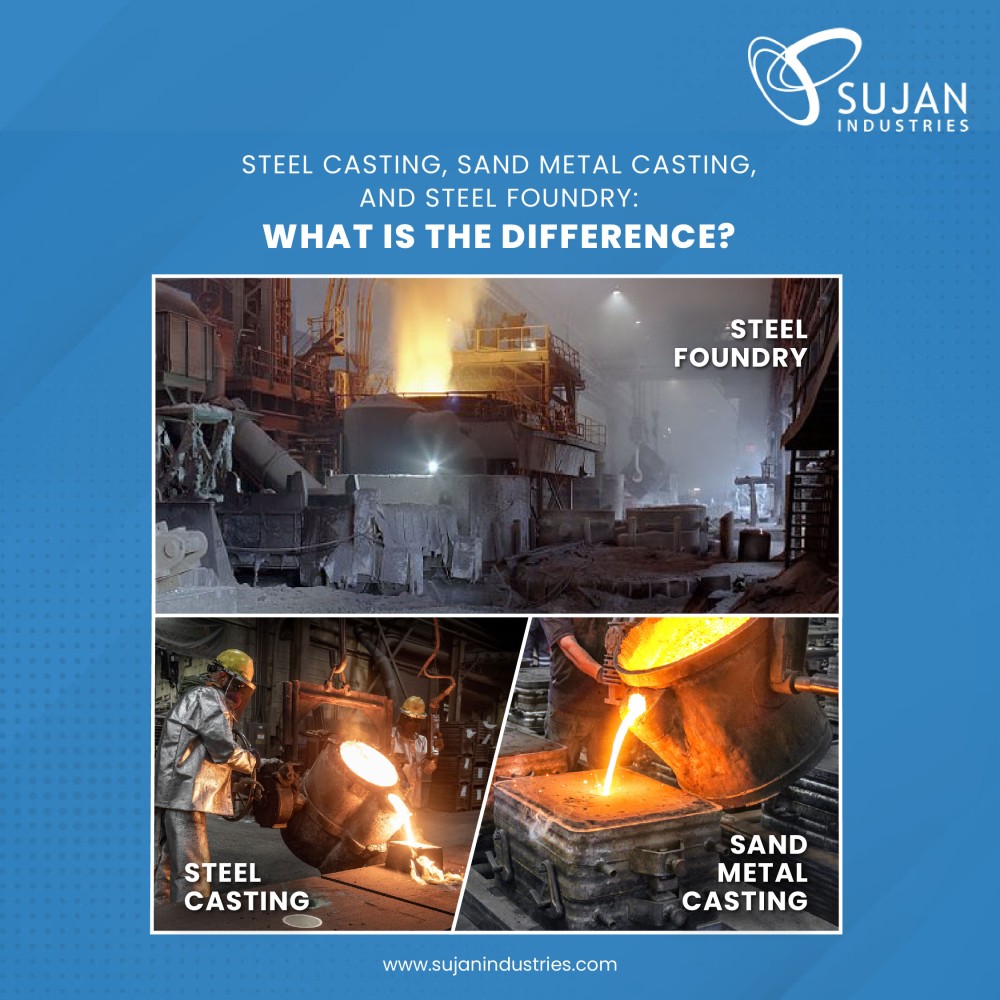
If you are struggling to choose between steel casting and sand metal casting for your industry requirements, read this post as we discuss each type and understand the differences.
Casting and Forging are key engineering sectors that supply diverse components to end-user industries such as railways, automobiles, and aerospace. Casting is a manufacturing process in which a liquid material is poured into a mold, which contains a hollow cavity of the desired shape and is allowed to solidify in molds. When the solidified part is ejected or broken out of the mold, it is known as casting.
Many different types of casting are performed in the casting industry. Each type accomplishes a goal and offers unique features. There are two common types of casting processes: steel casting and sand casting. Often they are confused with steel foundry. In order to better understand each, let us discuss them in detail.
Steel casting, also known as die casting, is a process in which a liquid or molten steel is poured into a die at high pressure. Here, the “die” refers to a mold to forge a casting in the appropriate shape and size as per the application. Unlike sand metal casting, the steel casting process requires the application of pressure.
After the molten material is poured into the die, it is left to solidify for a while. It is removed from the mold once solidified completely after which the gating material is removed and the final steel casting is ready.
The mold used in the casting process can be closed and reused immediately for the next batch. Depending on the heat size, steel grade, caster arrangement, and casting conditions, each ladle requires 45 to 90 minutes to cast. The steel casting process is widely used to manufacture complex shapes of medical and healthcare equipment.
Sand casting employs non-reusable sand molds to form metal castings. It involves pouring molten metal from a ladle into a sand mold directly. The matchplate is made of wood or plastic, and sand is filled directly into the matchplate inside the casting enclosure.
Once the sand is settled properly, the matchplate is removed, and the cavity is filled with molten material. Once the molten metal solidifies, the sand is shaken off the hot casting, and the gatings are removed, thus completing the casting process.
A sand mold can be used to create castings with fine exterior details, inner cores, and other features. Nearly every metal alloy can be cast with this method. And you need to prepare the casting molds with sand for every shot.
For a sand metal casting to be done successfully, the mold cavity must retain its shape until the metal has cooled and solidified completely. Pure sand breaks apart easily, hence unsuitable for sand casting, However, a special type of sand called molding sand is used in the sand casting process. Molding sand has bonding properties, is heat resistant, and is capable of holding its shape. The most commonly used casting sand is Silica (SiO2).
A foundry is basically a factory that melts metal and uses special tools to pour molten metal into molds, later allowing the molten metal to solidify. In other words, a steel foundry is a metal-casting manufacturing facility.
In addition to producing metal products for railroad, engines, or pipe components, foundries also produce metal components for machines that are used to make many of the essential customer products. Castings are generally carried out in two ways- sand castings and steel castings. So, a steel foundry is where metal is melted and cast into new shapes for different purposes.
So, here you have it, the difference between steel casting, sand casting, and steel foundry. Be it sand or steel casting, Sujan Industries stays at the forefront of the foundry industry to manufacture and deliver the highest-quality custom metal castings.
Made from different materials like carbon steel, alloy steel, aluminum, and more, we excel in producing castings for a variety of industries including railways, construction, agriculture, and more. In addition to ready-to-use casting products, we also produce customized castings according to the specific needs of our clients.
If you are looking for premium-quality casting products or want to learn more about our casting solutions, contact us today!